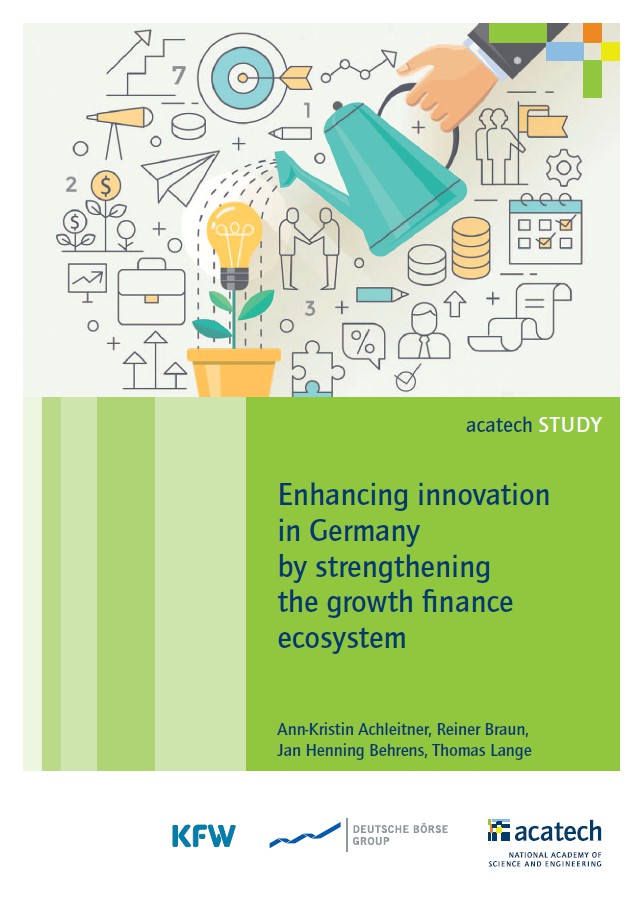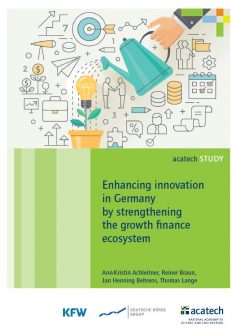acatech publishes English version of its STUDY on “Strengthening the growth finance ecosystem”

Munich, 24 September 2019
All too often, the financing chain for ambitious young companies breaks down during their growth phase. This problem affects both Germany and Europe as a whole. acatech, KfW and Deutsche Börse recently published a series of recommendations for strengthening growth finance in their joint study “Enhancing innovation in Germany by strengthening the growth finance ecosystem”. The recommendations are now also available in English.
Innovative next-gen high-tech companies will be key if we are to remain competitive with Asia and the US. However, the growth finance ecosystem for these companies in Europe still leaves a lot to be desired, especially compared to the US and increasingly also China. This challenge is of particular importance at EU level – Europe must enhance its growth finance ecosystem in order to ensure that innovative high-tech growth companies founded in Europe do not subsequently leave for other parts of the world, and to support the establishment of successful new high-tech companies in our continent. A recent study by the Technical University of Munich found that comparatively more capital is invested in European growth companies when foreign investors are involved, and that companies co-financed by foreign investors are subsequently likelier to be sold to foreign investors or floated on foreign stock exchanges. If anything, this exodus has increased in recent years.
Against this backdrop, the acatech STUDY “Enhancing innovation in Germany by strengthening the growth finance ecosystem” sets out a number of key recommendations for Europe. The publication is the result of a project of the same name, in which acatech brought together actors from the financial sector with representatives of high-tech growth companies, industry and academia. As well as outlining the status quo of the growth finance ecosystem in Germany and Europe, the project identified the concrete actions that are now required to strengthen it. acatech sought to provide a neutral platform for building the first targeted growth finance know-how interface between the technology and finance sectors
The authors’ key conclusion is that although efforts to mobilise traditional domestic capital – and in particular big institutional investors – are important, this is not enough on its own. There are at least two other areas where action to strengthen the growth finance ecosystem is necessary: alternative external and internal financing instruments are required (e.g. patient capital and innovative debt), as is closer cooperation between growth companies, established businesses and academic institutions.
Among other measures, the study recommends and outlines the establishment of a new co-investment platform. This would respond to the growing interest in direct investment, as well as making more capital available for larger financing rounds. Another recommendation involves the launch of a new stakeholder dialogue aimed at improving access to “patient capital” in the markets, something that is critically important to high-tech companies. The authors also conclude that it is necessary to get better at leveraging the (win-win) potential of cooperation between growth companies, established businesses and academic institutions, for instance with regard to the digitalisation of established businesses and the internal financing of growth companies. Concrete examples of how this cooperation could be improved include the creation and/or strengthening of professional entrepreneurship centres and the establishment of a jump-up initiative aimed specifically at innovative, fast-growing high-tech companies.
The acatech STUDY “Enhancing innovation in Germany by strengthening the growth finance ecosystem” outlines various ways and means of strengthening Europe’s high-tech growth companies. After all, these companies play an important role in an economy’s innovation system and in driving macroeconomic structural change – they continuously create new markets and their innovative technologies increase competition in existing markets.




